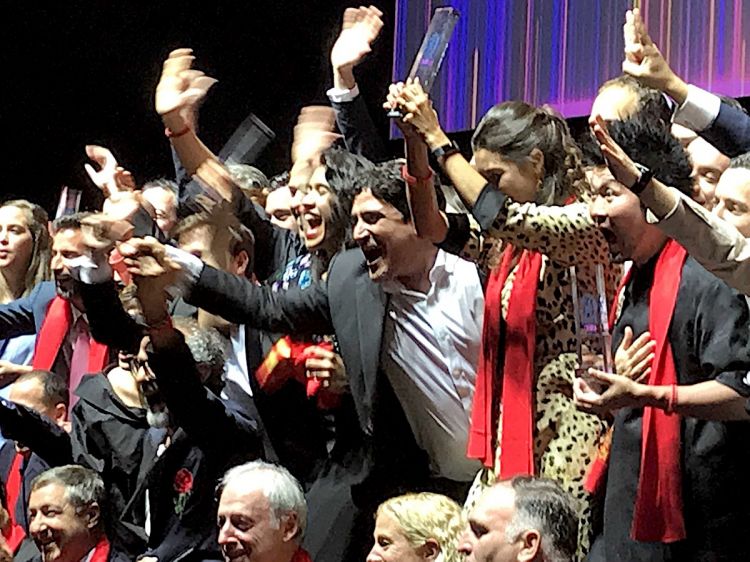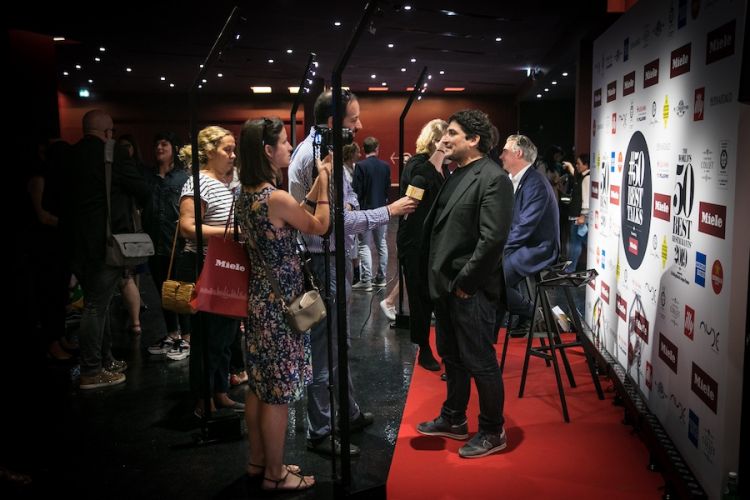At the 50BestTalks in Paris, a couple of weeks ago, luckily they didn’t just discuss the polemics about female chefs, a topic I thought was in the past, and not still a current issue of discrimination. I was stricken by the story of Mauro Colagreco, his journey from Argentina to Europe and France, until he settled on the high border of Mentone, between the French Riviera and Liguria. And from there, starting from Mirazur, he arrived at the top according to critics, in a magical year like 2019, when he got the third star from Michelin and the first place in the World’s 50 Best Restaurants.
The lesson’s title: Cuisine sans frontiers – Au dela des frontiers that is to say Cuisine without borders – Beyond borders. Listening to him was fascinating. Here’s a summary: I’d like to speak of my cuisine, and especially of the things on which my passion is based, which I continue to feed. All the essential aspects of my profession as cook. When I think of my career, my travels, the different experiences, all the journeys and changes, I find a constant, like a rhythm that influenced the entire process, the desire to meet people and share with them.

Big celebrations, on June 25th in Singapore, for Mauro Colagreco and the entire team at Mirazur. The restaurant in Mentone, on the border with Italy, was just nominated best restaurant in the world by the jury of the World's 50 Best Restaurants
«In my family, the pleasure of sharing is a very strong part of our heritage: my family is Argentinian, of Italian origins, and with a strong sense of family. And eating was a moment of sharing, and cooking a way to get closer to one another, opening doors and building bridges. I built my identity thanks to the contact and exchange with others. And I now draw inspiration from my travels, and in the same way I work hard to overcome boundaries and make sure we can all repossess the earth».
«Frontiers are, above all, meeting, discovery places. When you cross a border, that border no longer exists, and you have the chance to savour freedom. So I ask myself what is nationality and my answer is that we live a real paradox. On one hand, nationalism is growing stronger, and this sets some precise boundaries, but on the other hand we’re witnessing a large cultural plurality confirmed by science».

Non-stop interviews for Mauro Colagreco in Paris
The chef then told us an anecdote: «I’m working on a project to analyse DNA in the preparation of a menu, and in this sense it’s incredible how much science allows us to understand, going far beyond food allergies and preferences. So I decided to analyse my DNA as well, to find out the foundations of my origins. Well, I’m not Argentinian and I already say so, not only the exams. I am a sum of many people and corners of the globe: I’m 48% Italian, and 23% Spanish, and then there’s 2% Balkan and even a 0.1 Jewish from Eastern Europe. And then there’s 15% from South East Europe, 5.3 from North Africa and the Middle East, and 3.7 from the Far East. And there are traces of the native people of America, as well as other undefined roots. Who knows where I come from, I really don’t know the answer to that».
When we speak of cuisine, in fact we speak of the sum of different cuisines, the result of a continuous crossing. This is why it’s time to overcome nationalities and start to speak of humanity. When in 2006 I decided to settle in Mentone, I didn’t know what I was to discover and what my guests would discover. Mirazur was certainly not in the centre. It was right on the border between France and Italy, and this attracted clients.
«These days the restaurant is the sum of endless travels, commitments, influences, exchanges, a place where tradition and innovation have blended perfectly. And now it’s important to remember that I started by saying I don’t feel I belong to a specific region and then I ended up stating the importance of a place like Mentone. It’s not a contradiction. I think cooking reveals its essence if its roots go deep down». It’s the triumph of “glocal”.
The conclusion: «I’m proud to be one of the interpreters of a new way of being a chef in France, which is different compared to the past. We follow the rhythm of all the possible influences from around the world, we appropriate ourselves of things that belong to others, which is then summed to history, tradition and the know-how required by techniques. Think of how many foreigners are in our kitchens: Japanese, Chinese, Latin-Americans, Africans, Europeans, and so we’re back to what I was saying about my DNA. The New France of cooks must be without borders and without limits. In the words of the great Lebanese poet Khalil Gibran: “The entire earth is my homeland, and humanity is my clan”». A revolutionary concept, these days.
Translated into English by Slawka G. Scarso